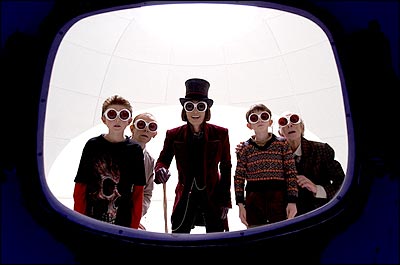
I humbly submit that I am the perfect audience for Tim Burton’s Charlie and the Chocolate Factory: Never read the book (though I like other Roald Dahl novels such as James and the Giant Peach and The BFG enormously) and never managed to sit through the entire 1971 Gene Wilder version (oh, as a parent, I tried, God knows I tried—too garishly tedious, too galumphingly long; cheesy before “cheesy” was cool).
Furthermore, I figured Burton would be an ideal Dahl director. In the past, he’s been unsentimental in his approach to both fantasy and children (from Edward Scissorhands to the very slightly underrated Big Fish). In Pee-wee’s Big Adventure, Burton proved he knows how to create the dazzlingly colorful world that Willy Wonka’s chocolate factory requires, and in his initial Batman, he presented the somber dankness that characterizes little Charlie Bucket’s rickety, sagging house. And when I saw the first raft of publicity shots of Burton’s partner-in-eccentricity, Johnny Depp, as a Willy with chalky skin, a lipsticky grin, a squat top hat, and hair covering his ears (those last two items left over from Depp’s marvelous Dead Man, perhaps?), I sensed a goofy greatness.
It turns out that Charlie and the Chocolate Factory is half goofy-great, and half just a goof. Burton is, as always, a brilliant creator of atmosphere: When you see the listing hovel inhabited by the Bucket family, you can almost hear the groan of the collapsing ceiling and feel the greasy slickness of the beds’ dirty sheets. When Charlie unwraps a Wonka chocolate bar, Burton makes the outer paper wrapper crackle and its tin-foil lining crinkle palpably; when anyone bites into the sweet food, you can feel the collapse of the dusky cocoa confection between your own teeth. And while you and the kiddies surrender to this Candyland board game come to life, you’ll also chuckle at the zippy little homages to everything from Busby Berkeley musicals to Psycho.
As the star who’s framed in the center of nearly every shot he’s in, Depp is a constantly surprising Willy Wonka. I peeked at some advance stories that suggested the actor is doing a clever satire on Michael Jackson—the skin; the wispy voice; the leading of children through the Neverland-like atmosphere of the Day-Glo candy factory; the primal fear of an abusive daddy (in this case, Brit horror-movie legend Christopher Lee). But that just doesn’t track; Depp is more original in his creation here than he was as a brazenly swashbuckling Keith Richards in Pirates of the Caribbean. Unlike the King of Pop, Depp’s loopy lord of lollipops is fully an adult, a crafty autodidact who’s caught in a paradox: He recoils from the slightest touch of the children who most appreciate his sugary creations. Depp speaks nothing like Jackson; he invents a new sort of hipster dippiness, dripping sarcasm while chattering breathlessly through the open mouth of a rictus smile, telling the kids that they’re “kinda starting to bum me out” unless they “keep on truckin’ ” with his long-striding tour of the chocolate factory.
If I’ve stinted on synopsis, it’s because I don’t know anyone besides me who isn’t familiar with the story, so I’ll just move on to the chief flaw: a rubbery narrative pace, which goes slack whenever Burton’s longtime orchestrator Danny Elfman halts the proceedings to have the happy slave-workers the Oompa-Loompas singsong semi-clever pastiches of the Beach Boys or the Beatles or Queen. (The yammering of much of this music reminded me why I never liked Elfman’s pre-movie career: leader of the fussy L.A. pop-punk band Oingo Boingo.) I also wanted more of Charlie, played by Freddie Highmore with the same winning pluck that made last year’s Finding Neverland bearable—he gets lost in much of the spectacle. But overall, I admire Burton and Depp’s success at turning children’s nightmares (the Dahl-derived critique of kids as creatures who eat too much and bloat or explode) inward, getting at something lacking in Wonka’s humanity. A damaged child grown into a man who maintains elaborate control of his surroundings, this Willy is less Michael Jackson–creepy than a chipper capitalist, for whom profits equal comfort, which equals creative freedom. Not that dissimilar, really, from the way Burton and Depp have managed to arrange their creative lives to work among the corporate Oompa-Loompas of Hollywood.
Charlie and the
Chocolate Factory
Directed by Tim Burton.
Warner Bros. Pictures. PG.